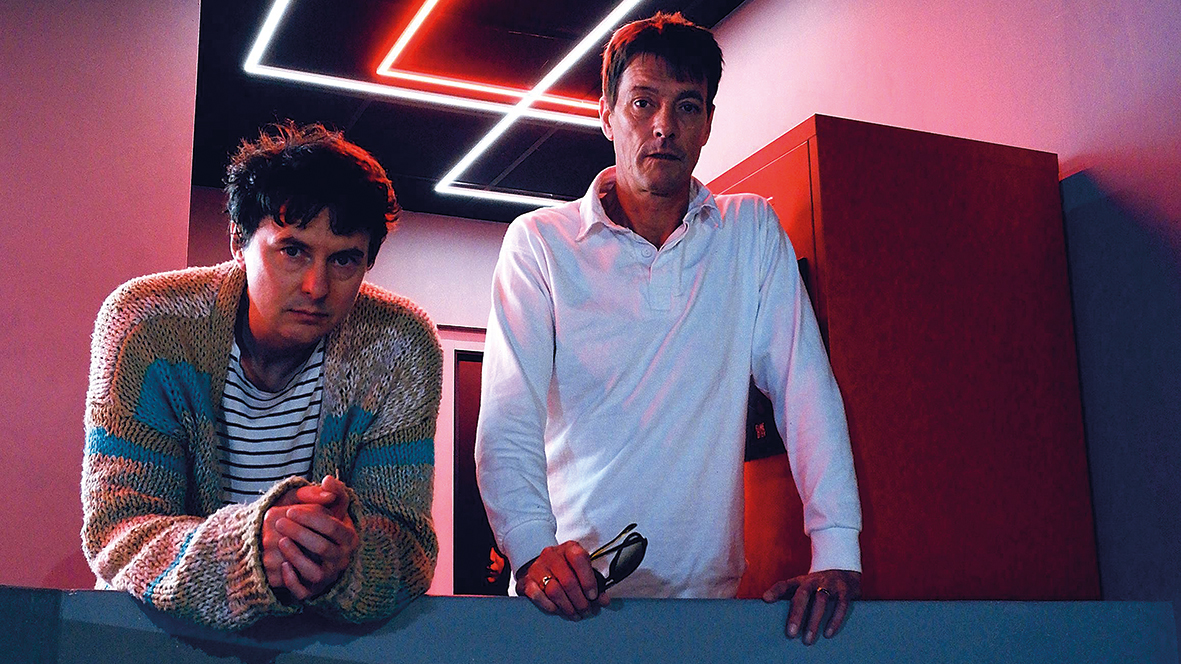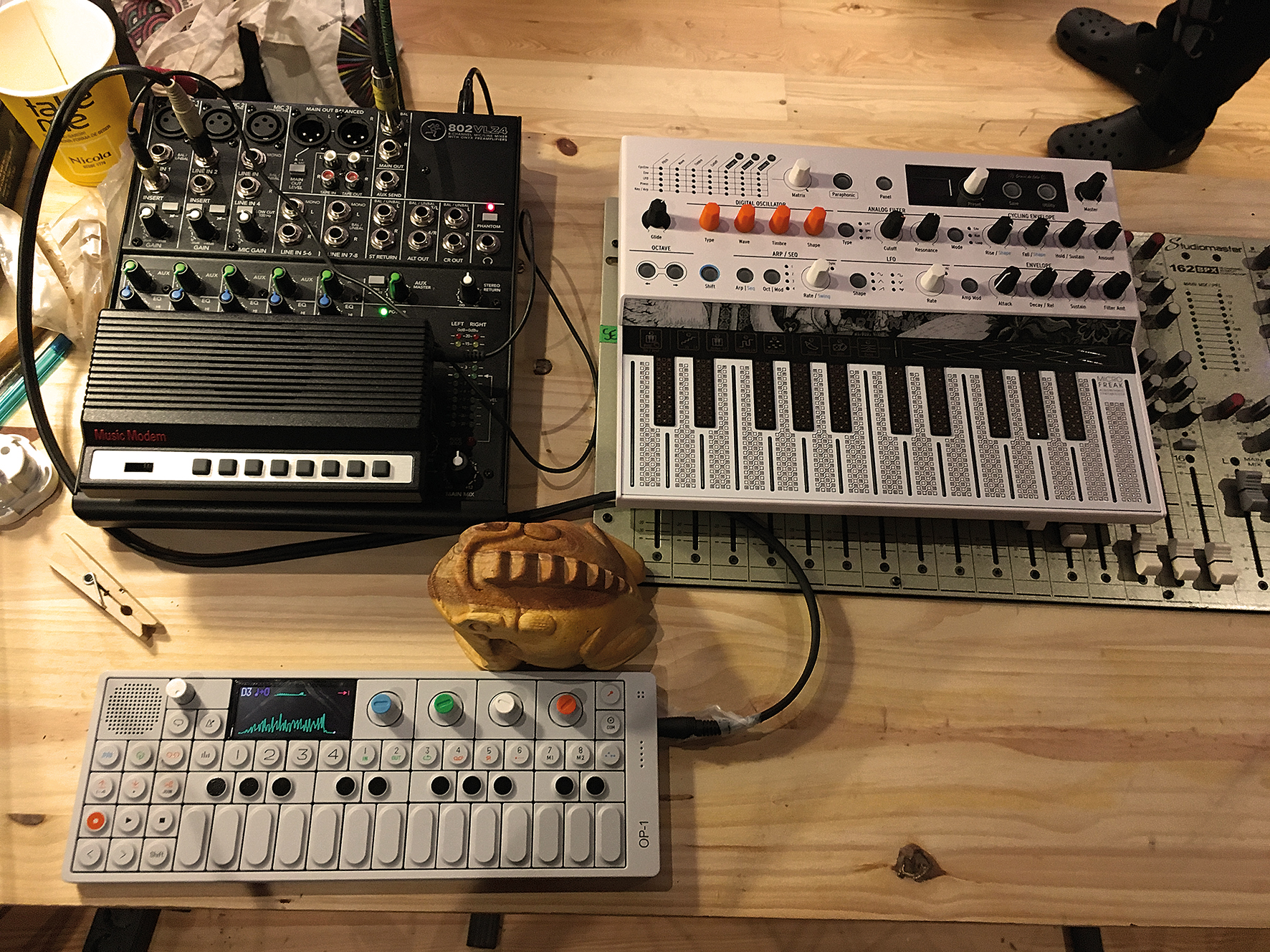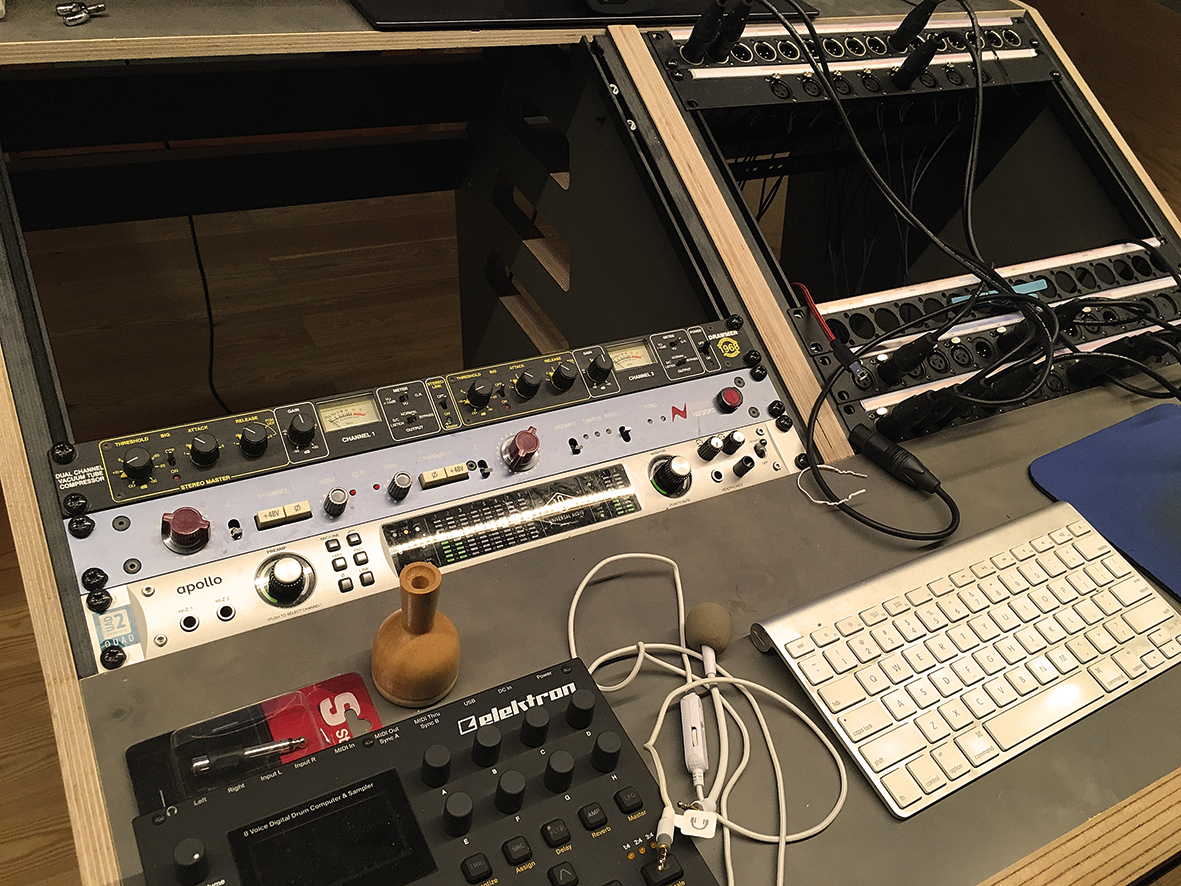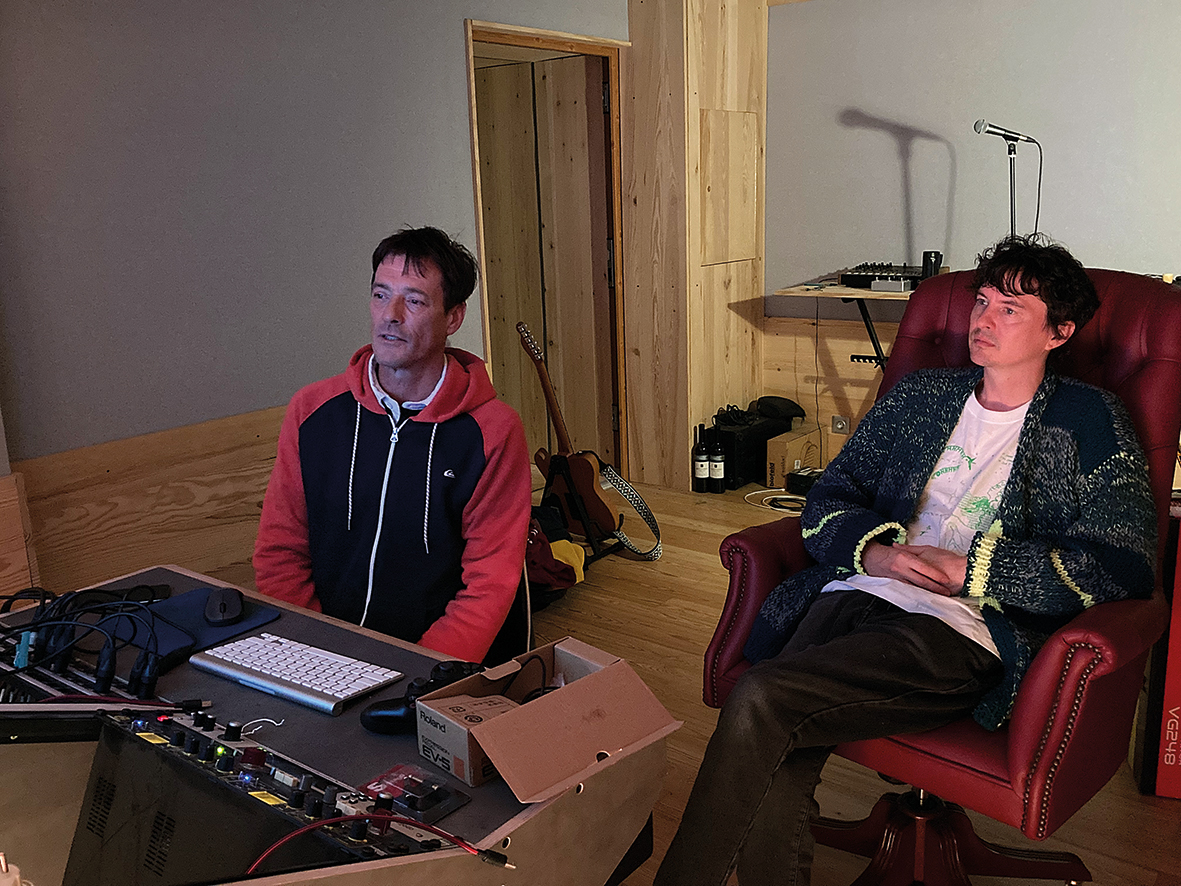Panda Bear & Sonic Boom: "I don’t think artists think about music in the same way that engineers do"
For Reset, long-time friends Panda Bear and Sonic Boom stare down global unease through the medium of samples. Danny Turner found out more

Want all the hottest music and gear news, reviews, deals, features and more, direct to your inbox? Sign up here.
You are now subscribed
Your newsletter sign-up was successful
Based in Portugal and no strangers to each other’s music, Noah Lennox (Panda Bear) and Peter Kember (Sonic Boom) first began working together on the former’s Tomboy album in 2011, with the duo also co-producing Panda Bear Meets the Grim Reaper four years later.
Having forged an enduring partnership, it was only a matter of time before they would fully collaborate – a process instigated amidst the isolation of the 2020 pandemic.
At first, Kember began re-familiarising himself with his long-lost collection of ’50s and ’60s American doo-wop and rock-and-roll LPs. Crafting song-length loops from classic intros to tracks by Eddie Cochrane, The Troggs and The Drifters, Lennox then added his own vocal observations to create fully-formed songs. A truly unique-sounding album, Reset’s happy-go-lucky demeanour is nevertheless contradicted by lyrical cynicism taking aim at global events.
So take us back to when you guys first met?
Noah Lennox: “The first interaction we had was over MySpace actually. Pete’s friend had played him an album of mine and in the liner notes I’d written that Spacemen 3 and Sonic Boom were one of my influences and he wrote back to say he thought the record was cool and maybe we could work together or play a show at some point. I wasn’t touring at the time but I did have a bunch of tracks recorded for what eventually would become Tomboy, so I asked him to mix the recordings and since then we’ve grown closer, professionally and personally.”
Pete, you also co-produced Noah’s album Panda Bear Meets the Grim Reaper. What was your early experience of working on those projects?
Peter Kember: “It was a good experience. I mixed Tomboy, which I thought was an awesome record that had a really strong, intense vibe, and so I naturally have some really good memories of that. Grim Reaper was more of a production role. Noah had sent me some skeletal demos that I really liked, so there were more conversations about what we were going to do together and I was down for the whole journey.”
Want all the hottest music and gear news, reviews, deals, features and more, direct to your inbox? Sign up here.
You’re both based in Portugal we understand?
PK: “I’m based in Sintra, which is a 30-minute drive from Noah in Lisbon, but it’s technically in the Lisbon area. I’d lived in the same little town in the UK for most of my life and had wanted to move away for decades. I’d been to the Algarve as a kid and remember liking it even then, but after spending time with Noah on the Tomboy album, rehearsing for shows and going back and forth on different projects I really started to like the way of life here.”
When did you decide it would be a good idea to fully collaborate on a release?
NL: “It kind of happened by accident. It was during the first wave of the pandemic when everybody was locked indoors and Pete had this idea of making loops from the intros to songs. He started sending me these big packs containing 30 or 40 loops that would be about four or five minutes long and I’d try to build some sort of arrangement or structure to those pieces, typically using vocals. After three or four songs I suggested it would be cool if Pete would sing the lead on a bunch of them too. There was no grand plan; it just came together that way.”

Pete, we understand those loops that you sent to Noah were inspired by your collection of ’50s and ’60s doo-wop and rock ‘n’ roll LPs?
PK: “The story is that the house I was living in with my wife at the time was too small for all of our shite and I couldn’t access the bulk of my records for a period of time. After moving here, I made sure I had access to them and began experiencing and enjoying things that I hadn’t heard since I was a kid. It also struck me that a lot of these tracks had intros that juiced the whole thing even though they were independent from how the rest of the song sounded. I just felt they had a vibe that we could grow something from.”
With the title Reset, is it as basic as you both pressing reset on your careers with this release, as it’s a pretty unique-sounding record?
NL: “That was part of it, but Pete and I hang out once every two weeks or so and during the pandemic we had a moment to stop and think about the state of everything and a lot of those conversations fed into the lyrics. We didn’t see each other for the first three months of the pandemic, but after that we were able to work together, mostly in my studio and then more in Pete’s towards the end.”
How quickly did the songs start coming together?
PK: “The songs were there as soon as Noah started writing to my loops and he’s very good at leaving space and putting things into spaces left by others. That makes it hard to fuck up because none of the sounds are fighting each other and that leaves a lot of room to mix. I have to be careful what I say, but I kind of believe that, these days, you can almost fix anything. I’d argue that the range of what you can do with an EQ on a voice makes the mic less important when it comes to how you’re processing the vocal.”
The album sounds super light-hearted and optimistic. Was that an antidote to the prevailing mood at the time?
NL: “We hoped the album would be escapist for people – that was the point of it. However, I should say that sonically the album sounds very cheerful but lyrically it’s quite down in the dirt and deals with much darker themes than the music might suggest. Pete and I were talking about how cynical we felt at the state of things at the time, which was pretty bad, but being cynical, negative and complaining about how we’re all doomed certainly doesn’t help anybody. With that in mind we thought, what if we go the other way and try to encourage or fire people up and give them something that’s quite energised and positive, and that acted as medicine for us at the time.”
The range of what you can do with an EQ on a voice makes the mic less important when it comes to how you’re processing the vocal
PK: “As the songs came through from Noah I realised they contained some of the most refined lyrics he’s ever written. It felt like they were little telegrams about the state of everything at the time, whether that’s the pandemic lockdown or the whole Trump situation. It was a big illustration of how people are beginning to realise that we’re living right on the edge of the edge.
“Safety nets are being got rid of and any real thought about how things impact society is being steamrollered by business. If there is a god, it must be business because that’s what everyone seems to pray to. I’m not sure if Noah was aware of all that, but it was nice to hear those succinct summations coming through in his lyrics, albeit not in a way that specified a day or an event.”
Is it true that you’re donating some of the proceeds?
PK: “The reason that we decided to donate to MAPS (Multidisciplinary Association for Psychedelic Studies) was because they’re trying to fix things sociologically and mend people who have post-traumatic stress disorder. I think practically everyone suffered from that during the pandemic and we’re still seeing echoes of it.”

Regarding the tone of the record, a lot of the songs are quite reminiscent of US Westerns – especially tracks like Danger, where one might imagine Clint Eastwood moseying into town on a horse...
NL: “That’s awesome [laughs]. It felt more to us like the songs might be set to a musical of some sorts, which is probably what you were thinking about. There’s definitely something theatrical about the album’s tone.”
PK: “I pictured it as late afternoon in a shady street somewhere in a Spanish town or down Mexico way, but that wasn’t conscious. Noah just picked the loops and started vibing with them, so a lot of that feel you’re describing is down to him.”
The opening track Gettin’ to the Point directly samples Eddie Cochrane’s Three Steps to Heaven. How did you go about clearing that?
PK: “That was the toughest one… we nearly had to take it off the record at one point. It’s funny because the intro to Three Steps to Heaven doesn’t really sound like the rest of the song – it almost sounds like it was edited on. The samples were all taken from hits, so the process was slow and expensive, but we cleared them all.”
NL: “We wanted the record to be positive and cure the ills of the world in a really grandiose way, yet we had these roadblocks where you’re not even talking to the original songwriter because some corporation owns the copyright. From that perspective, something we were trying to rally against was being shoved right back in our face, which was rough.”
We wanted the record to be positive and cure the ills of the world in a really grandiose way
PK: “Publishing these days is like a venture capitalist endeavour. The songwriters are all dead, but I guarantee that if we were able to run what we were doing by them, they’d be happy to be part of the whole thing. Because all of this was going on, I did start Googling about it and found some article about a boy band that Harry Styles was in.
“I think it was One Direction who had several hits that were heavily based on, not samples, but songs by The Who, and Pete Townshend basically said, where do you think we got all our ideas from? At the end of the day, we only have 12 notes that we share between us and a small number of scales, so it all just circulates around.”
It must be wonderful to build on a sample like that. Is that when you realise how good a riff is?
PK: “I didn’t consider that when we were doing it, but it makes my day to see that we’re now co-writers with Eddie Cochrane or I’ve written a song with Doc Pomus [laughs].”
NL: “A bunch of the time I knew that I knew the song but I didn’t have a melody in my head when I was listening to it. For me, Pete’s loops instantly enabled me to start rocking something and gave me some immediate juice to work with.”

Were the strings on the track Livin’ in the After also sample-based?
PK: “That song is actually made from two samples. The verses go back and forth and when the track kicks into the chorus it riffs off of those strings without the vocals in it. Noah arranged that track but the chorus was tough because the sample goes out of time. Most of the other tracks looped happily on a grid because the samples were only two or three chords long, but The Drifters sample was more extended.”
Did you find it interesting to examine the tuning on those classic samples?
PK: “It was interesting to find how much the tuning drifted on a Doc Pomus track like Save the Last Dance for Me and Noah also mentioned how the sample was out of tune on a Motown song by The Temptations called It’s Growing. We didn’t end up using that one, but maybe that’s why those songs stand out. When I was in Black Sheep studios one time, the engineer analysed a sample of another Motown hit through iZotope and realised that every instrument on the track was out of tune. It’s interesting working with other people’s stuff like that because you discover things you wouldn’t normally discover about them.”
Was getting your original music to match the sample a tricky process?
NL: “In its basic form, the tracks were created quite quickly, but the fine-tuning of the original idea and the editing was kind of painstaking and took a long time, especially when it came to setting the lyrics to the form I wanted to go for. I don’t like to just write words and set them to music – I find that way of working is kind of clunky, so I’m really choosey about using certain words and how it sounds to sing them.”
Livin’ in the After and a few other tracks appear to feature a lot of strange percussion effects. What were you using for those?
PK: “I have a big tub of percussion that I’ve accumulated over the years, so you’ll hear these funny little party whistle things appearing on the record a bunch. A friend of mine gave me a guiro, which is a Latin American percussion instrument, and I bought a couple more that were also used to add some flavour.
A lot of the synth parts that Noah played were made using an Arturia MicroFreak. We turned it on and preset one got an immediate look in
“Noah and I were talking about ska and rocksteady stuff from the late ’60s. Back then, Jamaica was a seriously fucked up place on many levels but they made all of this awesome music. They sang about their problems in a way that felt uplifting and it’s really impressive how they’d make these really beautiful, vibed-out tracks using rhythmic instruments like the guiro whilst singing about the harsh realities of life, and that definitely inspired us.”
Did you play any acoustic instruments yourself on this?
NL: “Yes, although not on every song. We often used a lot of acoustic guitar to support the sample, but it’s pretty low in the mix so it’s tough to hear, and there are a couple of songs that have live bass rather than synth bass.”
What type of synth sounds did you end up using to complement the tracks?
PK: “All the harmoniser stuff was done on the Eventide H910 plugin, which is an awesome match for the original unit. It has a certain weird magic to it, but we were just trying stuff and got lucky. A lot of the synth parts that Noah played were made using an Arturia MicroFreak that I’d bought and had barely got out of the box. We turned it on and preset one got an immediate look in.
“With the percussion and all the electronics, I was just trying to find things that were as vibey as possible and taking notes to reaffirm what I already knew. The acoustic guitar is something I’ve used on my productions for years, so using that and stuff like handclaps are all well-known tricks when it comes to overdubbing because they can really vibe tracks out and add a magic to things.”
Noah, would it be fair to say that you have a fairly basic studio setup?
NL: “At the beginning of this record, the kitting out of my studio had kind of just started and this album was only the second or third thing I’d done in there. I just want a really simple setup with each piece of gear being high quality rather than a whole bunch of stuff that’s of varying quality. I want the studio to be streamlined so I can just go for it.”
Your studio desk certainly looked fairly incomplete at the beginning of the project…
NL: “Apart from my Apollo and Neve compressors, the only thing I used on the desk was a Drawmer 1968 compressor, which I put vocals through on a couple of songs because I needed the chorus to be a lot more powerful. Pretty much everything else I did was in the box using Luna as my DAW because it plays nicely with the Apollo interface and I have a lot of their plugins. I basically used Luna as a tape machine, then we took the recordings from that and stemmed them out into Pro Tools to finalise everything.”
PK: “Mixing, EQing and quite a lot of the effects were done in Pro Tools because that’s what I always work in for mixing. Once I could afford to be a Pro Tools user – when I didn’t need the hardware anymore, I really got into it, which probably came from working with MGMT who were also Pro Tools guys. When they upgrade and update it, it mostly stays the same and I hate it when those companies try to reinvent themselves. I’ve been through too many DAWs in my career, but I like the Pro Tools interface a lot and I’m used to it now.”
How does your studio compare to Noah’s?
PK: “My studio is a little room with an awesome view of the mountain and a door that goes onto the patio so you can work inside and out, but it’s for mixing really and recording direct. I don’t do vocal stuff here because I like to work with an engineer as there’s certain parts of the creative process where I really like to have someone else overlooking different aspects.
I don’t think artists think about music in the same way that engineers do
“I don’t think artists think about music in the same way that engineers do, so for this record, recording, mixing and editing were all very different disciplines. An engineer will usually have a much better perspective on that, especially in studios that have a range of microphones, for example. I also like working in an environment where it’s a team effort, I can get input from people who know better than me and we’re all working towards the same goal.”
NL: “I can go either way. About 70% of what I do is completely solo, particularly during the writing phase, but I also feel there’s a lot of benefit to working with engineers in a proper studio because I’m not super good at mic placement or miking drums. I just try and bend things until they sound good, so it’s better to work with someone who knows what they’re doing because it streamlines the process.”
PK: “Sometimes when you’re working on stuff, you start to discount things because you’re used to working in a particular way. To be fair, I did most of the vocals for my tracks, but some were done at Noah’s and others at Black Sheep studios here in Portugal. As Noah said, we really didn’t have a grand plan and the process was incredibly casual. Noah would say, ‘What mic do you want to use?’ and I’d say, ‘Whatever one is set up’.”
It definitely sounds like it was a fun record to work on, even though the reality might have been different?
PK: “It was tough times to be working in – it didn’t feel like a party I can tell you, but tough times sometimes produce really good music. I always repeat what Jim Dickinson said to me, ‘When you’ve got a great song, it’s pretty hard to fuck things up’. It doesn’t matter if it’s the worst recording on the worst day, you’ll get there and Noah’s songs were really good and naturally inspired us all of the time. Even though I mentioned that we kept hitting on things and getting lucky, I suppose we’re both at a point in our careers where we’ve both made a lot of records and have a lot of experience, and that comes through.”
Has this album given you both ideas about creating another conceptual album from a different era perhaps?
PK: “Towards the end of the sessions for Grim Reaper, Noah said something along the lines of let’s do a record that’s just vocals and percussion. I thought that was interesting and because I never forgot he said it, percussion became one of the really important parts of this record. The propulsive nature of the songs usually comes from percussion arrangements and the stuff we did live in Noah’s studio, and because that had a natural energy to it the album was made surprisingly quickly.”
NL: “This album definitely made me want to make something else with Pete, but I usually wait for an idea to come to me and everything follows from that. It also needs to feel exciting to me over the period of a couple of months. In Reset’s case, it was all about the gestation period I spent with Pete’s intro loops that bore fruit, but I wouldn’t want to do a Reset part two.”
Panda Bear & Sonic Boom's debut album Reset is out now on Domino Records.

